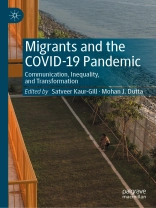This book looks at the impact of the COVID-19 pandemic on migrants globally who bear disproportionate burdens of health disparities. Centering the voices of migrants as anchors for theorizing health, the chapters adopt an array of decolonizing and interventionist methodologies that offer conceptual communicative resources for re-organizing economics, politics, culture, and society in logics of care.
Each chapter focuses on the health of migrants during the pandemic, highlighting the role of communication in amplifying and solving the health crisis experienced by migrants. The chapters draw together various communicative resources and practices tied to migrant negotiations of precarity and exclusion. Health is situated amidst the forces of authoritarianism, disinformation, hate, and exploitation targeting migrant bodies. The book builds a narrative archive witnessing this fundamental geopoliticalrupture in the 21st century, documenting the violence built into the zeitgeist of labor exploitation amidst neoliberal transformations, situating health with the extractive and exploitative forms of organizing migrant labor.
The book is essential reading for advanced undergraduate or graduate courses for scholars studying critical and global health, development, and participatory communication, migration, globalization, international and intercultural communication interested in the questions of precarity and marginality of health during pandemics.
قائمة المحتويات
Section 1: Introduction to COVID-19 and Migrant Health.- Chapter 1: Migrant Health Crisis, Precarities and COVID-19.- Section 2: Method and Measures in studying Migrant Health during the COVID-19 crisis.- Chapter 2: Digital Ethnography: Studying Migrant Health During the Pandemic.- Chapter 3: Listening for Erasures as Method in Making Sense of Health Disparities: Culture-centered approach.- Chapter 4: Migrants, Mental Health and COVID-19: Foreign Domestic Workers in the Margins.- Chapter 5: Migration, Displacement, and Health: Labor and Health.- Chapter 6: Migrants, Technology-Use and COVID-19 response.- Chapter 7: COVID-19 and health of Rohingya refugees Section 4: Praxis with/at the Margins.- Chapter 8: Narrowing health and communication inequities for migrant workers: Creating dialogic spaces with Facebook Live.- Chapter 9: Arts-Activism, Trauma-Informed Communication Interventions, and Migrant Coping During the COVID-19 Pandemic.- Chapter 10: Co-creating culture-centered interventions with migrant constructions workers amidst COVID-19.- Chapter 11. Epilogue.
عن المؤلف
Satveer Kaur-Gill is a Postdoctoral Research Associate at The Dartmouth Institute of Health Policy and Clinical Practice, Geisel School of Medicine, Dartmouth College. Broadly, Satveer studies the role communication plays in bridging health equity for populations facing health disparities.
Mohan J Dutta is Dean’s Chair Professor and Director of the Center for Culture-centered Approach to Research and Evaluation (CARE) at Massey University. He teaches and conducts research in international health communication, critical cultural theory, poverty in healthcare, health activism in globalization politics, indigenous cosmologies of health, subaltern studies and dialogue, and public policy and participatory social change. Currently, Mohan sits on the editorial board of seven journals. He is the Editor of the Journal of Applied Communication Research and the Editor-in-Chief of Frontiers in Health Communication.












